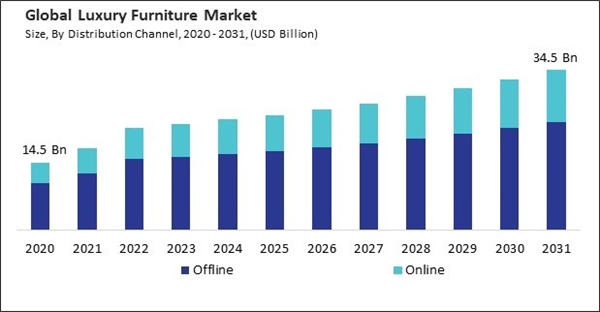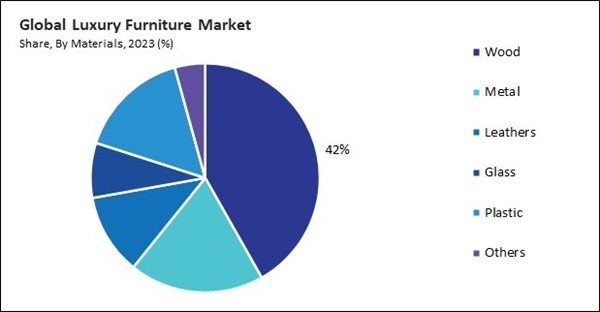Hospitality's primary goal is to provide guests with a memorable and enjoyable experience. This furniture plays a crucial role in achieving this by ensuring comfort, beauty, and an aura of exclusivity. Consequently, the hospitality segment would acquire nearly 46.1% of the total market share in commercial segment by 2031. High-quality, aesthetically pleasing furniture can significantly elevate a guest’s perception of a hotel or resort, impacting their overall satisfaction and likelihood to return or recommending the establishment.
Consumers today view their living spaces as extensions of their identity and lifestyle. There is a growing desire to customize spaces to reflect personal tastes, achievements, and experiences. Furthermore, platforms like Instagram, Pinterest, and Houzz have heightened consumer awareness and interest in interior design. Users regularly share and consume home aesthetics content, inspiring others to invest in their living environments. Hence, the rising importance of home décor and aesthetics drives the market's growth. Additionally, as more high-end residential properties are developed, there is a corresponding increase in demand for this furniture to outfit these spaces. Similarly, corporate offices, particularly those in high-end professional services, invest in this furniture to create impressive business environments that reflect their brand image and ethos. Therefore, real estate and hospitality growth is propelling the market's growth.
However, this furniture is distinguished by its use of high-quality materials, such as premium wood, fine leather, and exotic textiles. In addition, creating unique and innovative furniture designs involves considerable investment in research and development. In conclusion, the high production cost is hindering the market's growth.
Driving and Restraining Factors
Drivers- Rising importance of home décor and aesthetics
- Real estate and hospitality growth
- Increasing disposable income
- High cost of production
- Limited consumer base
- Increase in online retailing in the furniture industry
- Luxury rentals and subscription services
- Availability of the counterfeit products
- Competition from mid-range and mass market brands
Distribution Channel Outlook
Based on distribution channel, the market is segmented into offline and online. The online segment attained 30.8% revenue share in the market in 2023. Online platforms enable the furniture brands to reach a global audience beyond their physical store locations. This accessibility allows them to tap into new markets and target affluent consumers who may not have access to local showrooms.Materials Outlook
Based on materials, the market is divided into metal, wood, plastic, glass, leathers, and others. The metal segment acquired 18.9% revenue share in the market in 2023. Metal finishes, such as stainless steel, brass, and gold, contribute to a contemporary and sleek aesthetic that appeals to modern interior design trends. They add a sense of sophistication and elegance to the furniture pieces.End User Outlook
By end user, the market is segmented into residential and commercial. The commercial segment procured 38.3% revenue share in the market in 2023. For businesses, the aesthetic appeal of their office space directly reflects their brand’s prestige and professionalism. This furniture in offices, lobbies, and meeting rooms enhances the corporate image and can make a strong impression on clients, partners, and investors.Regional Outlook
Region-wise, the market is analyzed across North America, Europe, Asia Pacific, and LAMEA. The North America region witnessed 37.9% revenue share in the market in 2023. North America, particularly the United States and Canada, boasts a large population with high disposable income levels. This affluence enables more consumers to invest in luxury items, including high-end furniture, to enhance their living environments and express personal style.List of Key Companies Profiled
- Ashley Furniture Industries, LLC
- Lee Industries, Inc. (American Leather Holdings LLC)
- Maiden Home, Inc.
- Williams-Sonoma, Inc.
- Kimball International, Inc.
- Century Furniture LLC (RHF Investments, Inc.)
- Duresta Upholstery Limited
- Giovanni Visentin S.r.l.
- Scavolini S.p.A.
- Muebles Pico S.A.
Market Report Segmentation
By Distribution Channel- Offline
- Online
- Wood
- Metal
- Leathers
- Glass
- Plastic
- Others
- Residential
- Living & Bedroom
- Kitchen
- Outdoor
- Lighting
- Bathroom
- Commercial
- Hospitality
- Office
- Others
- North America
- US
- Canada
- Mexico
- Rest of North America
- Europe
- Germany
- UK
- France
- Russia
- Spain
- Italy
- Rest of Europe
- Asia Pacific
- China
- Japan
- India
- South Korea
- Australia
- Malaysia
- Rest of Asia Pacific
- LAMEA
- Brazil
- Argentina
- UAE
- Saudi Arabia
- South Africa
- Nigeria
- Rest of LAMEA
Table of Contents
Companies Mentioned
- Ashley Furniture Industries, LLC
- Lee Industries, Inc. (American Leather Holdings LLC)
- Maiden Home, Inc.
- Williams-Sonoma, Inc.
- Kimball International, Inc.
- Century Furniture LLC (RHF Investments, Inc.)
- Duresta Upholstery Limited
- Giovanni Visentin S.r.l.
- Scavolini S.p.A.
- Muebles Pico S.A.










